
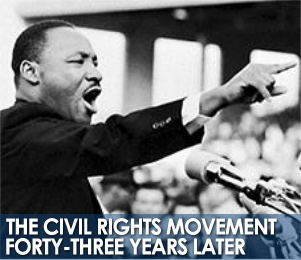
THE CIVIL RIGHTS MOVEMENT FORTY-THREE YEARS LATER: ARE WE STILL PROTECTED?
by Sadiya Ahmed
From the Montgomery Bus Boycott to the marches in Washington, with the leadership of Dr. Martin Luther King Jr., activists protested and fought against the discriminations that lay at the very foundation of America.
They questioned the notion of "separate but equal" institutions, which were always separate but never equal. Everyday heroes emerged and demanded what they felt was owed to them: equality.
Rosa Parks, an African American woman, refused to give up her seat on the bus to a Caucasian man. Martin Luther King, Jr. delivered his "I have a dream" speech while Thurgood Marshall argued the Brown v. Board of Education case before the Supreme Court.
The struggle for civil rights is a deeply-rooted one in American history, reaching its climax with the passage of the Civil Rights Act of 1964.
Forty-three years later, Americans enjoy the right to be free from discrimination based on race, color, religion, sex, national origin, and sexual orientation.
The existence of such protections is not the result of everyday legislation; it is an end product of the civil rights movement which we observe each year, on the third Monday of every January.
Martin Luther King, Jr. Day has become a day that celebrates the struggle which has brought Americans closer to equality.
The civil rights movement redefined the meaning of "being American." For the first time being American was not contingent upon one's skin color. The inclusion of minorities as Americans meant that, for the first time, they were citizens, without strings attached; individuals, regardless of their race were able to call themselves American citizens and expected, and were entitled, to be treated equally.
Today, an alarmingly high number of individuals of Middle Eastern decent face delays getting their citizenship. They are denied their American identity, similar to the way African Americans were prior to 1964. They are denied the right to vote, participate in their government, or be active constituents, regardless of what their actual rights are. They are discriminated against because of their ethnicity and religion, something that was outlawed decades ago.
The early civil libertarians came together with one vision: all people must be ensured the same protections and liberties. However recently, civil rights violations have become so frequent that they have become a part of our lives.
The universal protections promised forty-three years ago do not stop discrimination against people who seem different. Reports of discrimination against individuals at the workplace, retaliation, and hate crimes flood the media yet often go ignored.
We have taken several steps backwards and resorted to legislation such as the Patriot Act, stripping people of the protections that were granted a mere four decades ago.
We are facing an erosion of civil rights which has sent us several steps backward. Legislation such as the Patriot Act permits secret and warrantless searches. In addition, the current provisions of the controversial legislation permit the indefinite detention of individuals, a problem that has become more widespread.
Our civil rights, which prominent figures like Martin Luther King Jr., Thurgood Marshall, Rosa Parks, and Malcolm X dedicated their entire lives to, are being trampled upon and we all continue to remain silent.
Sacrifices made by everyday people a mere four decades ago seem to have been forgotten, and we are left with a reminder that there was a time when our nation fought for the rights of individuals.
We celebrate Martin Luther King Day each year without asking ourselves if those rights are still secure. We seem to have forgotten about the dangers of a tiered citizenship system, where a person is considered first or second class, based upon his race.
It is high time that we not only recognize the grave danger we face of having all of our fundamental rights stripped away, but we must also actively strive to protect them, especially on a day that honors the notion of civil rights. Martin Luther King, Jr. Day should not become the token day for civil rights, where we congratulate ourselves for having come so far while ignoring the fundamental problems we face today. Rather, it should be an active part of what was once the civil rights movement.
copyright © 2007, CAIR-Chicago
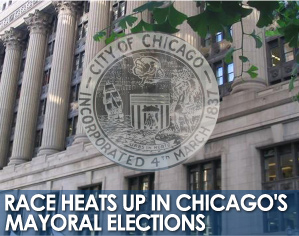
RACE HEATS UP IN CHICAGO'S MAYORAL ELECTIONS
by Erin Hartnett
The midterm Congressional elections are over but politics in Chicago are just starting to heat up. Round two of the elections in Chicago is scheduled to be held on Tuesday, February 27. In this year's municipal elections, the Mayor is up for reelection, along with selected members of the Chicago City Council and various local offices.
Following Representative Jackson and Representative Gutierrez's decisions to remain in Washington for another term, this year's mayoral campaign places five-term Mayor Richard M. Daley against Cook County Circuit Court Clerk Dorothy Brown and William "Dock" Walls, III.
THE CANDIDATES
Mayor Richard M. Daley
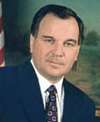 If he is elected to and serves his entire sixth term, Mayor Richard M. Daley would be in office for 22 years, besting his father's record by one year. However, for the first time since his 1989 campaign, Daley seems to be facing a credible challenger. If he is elected to and serves his entire sixth term, Mayor Richard M. Daley would be in office for 22 years, besting his father's record by one year. However, for the first time since his 1989 campaign, Daley seems to be facing a credible challenger.
The Mayor has heralded the various accomplishments of his past five terms, including the building of Millennium Park, an increase in tourism to the Chicago area, updates to the Chicago Transit Authority, a potential 2016 Olympic hosting bid, and continued North Side development. However, his administration has been plagued with the "Hired Truck Program" scandal, discontent over the destruction of Meigs field, and allegations of patronage.
Cook County Circuit Court Clerk Dorothy Brown
 An attorney and a Certified Public Accountant, Dorothy Brown has been the Cook County Circuit Court Clerk since 2000 and has received the 2002 Hillary Rodham Clinton Leadership Award from the Illinois Democratic Women, the 2003 Marks of Excellence Award from the National Forum for Black Public Administrators, the 2003 Women of Achievement Award from the Anti-Defamation League, and the 2004 NAACP Proviso/Leyden Medal of Freedom. An attorney and a Certified Public Accountant, Dorothy Brown has been the Cook County Circuit Court Clerk since 2000 and has received the 2002 Hillary Rodham Clinton Leadership Award from the Illinois Democratic Women, the 2003 Marks of Excellence Award from the National Forum for Black Public Administrators, the 2003 Women of Achievement Award from the Anti-Defamation League, and the 2004 NAACP Proviso/Leyden Medal of Freedom.
She has spoken out against Mayor Daley's management of the Chicago Public Schools, proposing her own "Ten Point Plan" for educational reform which has been attacked as "cosmetic" by Walls. Where Brown wants educational funding to derive from state sales and income taxes, Walls endorses using state income and property taxes. Brown also wants an end to what she deems "educational apartheid." This term, which has been seen by many as inappropriate, is used by Brown to reference the vast disparity between elite and low-income public schools.
William "Doc" Walls
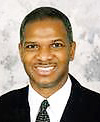 William "Dock" Walls, III was an assistant to former Chicago Mayor Harold Washington from 1983 to 1986. A graduate of the Chicago-Kent College of Law, he served as National Political Director for the Reverend Jesse L. Jackson's Rainbow PUSH organization and was the Illinois Primary surrogate for John Kerry's primary campaign. He garnered nearly 40,000 nominating signatures, and was the first challenger in six years to submit more signatures than Daley. Currently, Walls is director of the Committee for a Better Chicago. He has yet to release an education plan in response to Brown's, though he claims his is more structural and will be released sometime in January. William "Dock" Walls, III was an assistant to former Chicago Mayor Harold Washington from 1983 to 1986. A graduate of the Chicago-Kent College of Law, he served as National Political Director for the Reverend Jesse L. Jackson's Rainbow PUSH organization and was the Illinois Primary surrogate for John Kerry's primary campaign. He garnered nearly 40,000 nominating signatures, and was the first challenger in six years to submit more signatures than Daley. Currently, Walls is director of the Committee for a Better Chicago. He has yet to release an education plan in response to Brown's, though he claims his is more structural and will be released sometime in January.
POINTS OF CONTENTION
One of the predominant issues arising in the race involves the 12,500-signature petitions required to place candidates on the ballot. William "Dock" Walls, III has challenged the validity of the Mayor's over 24,100 nominating petition signatures, claiming that at least 17,000 of them are either forgeries or from non-registered voters. In order to remove Daley from the ballot, Walls needs to nullify over 11,600 of the signatures—a daunting task.
In a Chicago Board of Elections hearing on the issue, Walls' and Daley's campaigns were each allowed to choose 500 signatures to be reviewed along with 6 additional pages of signatures. The Daley campaign has stood behind their signatures, going so far as to allow the Election Board to select the 500 names. In addition, Walls and Brown have agreed not to challenge each other's petitions.
Another area where the Daley, Brown, and Walls campaigns have come into disagreement is the scheduling of debates. The Mayor has announced that he will not participate in any of the debates, citing that he has continually answered questions from the press on issue positions multiple times a week throughout his time in office, and debates are only an opportunity for his opponents to gain free publicity.
Brown has characterized Daley's failure to participate as a fear of "answering tough questions," and an attempt to "hide from people." Walls has taken his objection a step further—threatening to follow the Mayor to public appearances, stating "Mayor, debate me or they'll be no surcease. I'll follow you everywhere."
For the first time since his election in 1989, Mayor Daley appears to be facing serious challengers for control of Chicago. It remains to be seen whether the various allegations plaguing his administration will be strong enough to overpower his strong base of support in the city.
If, on February 27, none of the candidates receive more than fifty percent of the vote, a runoff election will be held in April between the two highest finishers. The presence of two viable contenders increases the likelihood of a runoff election, so for the first time in nearly twenty years the citizens of Chicago may witness a hotly contested mayoral race.
However, both challengers will need to run more than "Anti-Daley" smear campaigns if they want to unseat the political powerhouse. Brown and Walls must put aside petty mudslinging and juvenile character attacks in order to introduce real policy alternatives and establish credibility. If not, Mayor Daley can look forward to a record-breaking 22 years in office.
copyright © 2007, CAIR-Chicago
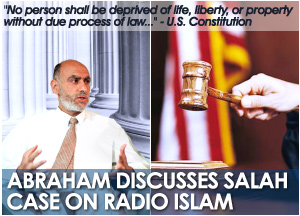
CIVIL RIGHTS COORDINATOR DISCUSSES MUSLIM CIVIL RIGHTS CASE ON RADIO ISLAM
CAIR-Chicago Civil Rights Coordinator, Christina Abraham, spoke on Radio Islam regarding the trial of Muhammad Salah. The interview aired on Friday, December 29th and was hosted by Ayesha Mustafaa.
Radio Islam Interview:

Abraham discussed the constitutional issues surrounding the case and the case’s impact upon civil liberties, explaining, "this is of concern to all Americans, because there are a lot of issues about this case that deal specifically with the rights that we have that are guaranteed to us by the Bill of Rights and the Constitution."
For months the civil rights community in the Chicago area has held its breath awaiting the outcome of a trial with such far-reaching implications. The trial of Mohammad Salah and his co-defendants, now in its final week, is more than just a trial about alleged money-laundering; it is about how far a government can go in sacrificing the civil liberties and due process guaranteed by the Constitution.
"The Government was responsible for taking away [Mr. Salah's] property and his liberty without the due process of the law... he didn't get to face his accusers, he just had his liberties taken away from him without any kind of way to address it" stated Abraham.
Contact Christina Abraham at
Radio Islam is on WCEV 1450 AM Monday through Sunday from 6pm to 7pm. Under the umbrella of Sound Vision Foundation, RadioIslam.com launched its first show December 14, 1999 with the goal of providing informative and creative Internet and broadcast radio programming.
copyright © 2007, CAIR-Chicago
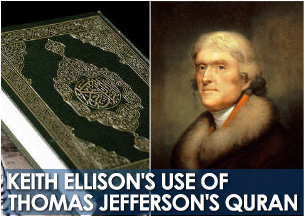
KEITH ELLISON'S USE OF THOMAS JEFFERSON'S QURAN
by Sadiya Ahmed
Newly-elected members of Congress, as well as returning members, were sworn in on January 4, 2007. They promised to protect and uphold the Constitution and its principles. Later, in their private chambers, they then had a chance to "swear in" on a text of their choice. Whereas most use the Bible, for the first time in American history a congressman took his oath with a copy of the Quran.
Keith Ellison, the newly-elected Democrat from Minnesota, used the Quran for the second part of his ceremony. As an American-Muslim, he has made history by being the first Muslim elected to the House of Representatives. Spurring a media buzz, many have not been receptive to Ellison's choice.
After weeks of debate about the preservation of "American culture" and "Judeo-Christian values," Mr. Ellison announced another unique twist: The Quran he used during the ceremony was lent to him by the Library of Congress' rare and special collections division, as it belonged to one of America's founding fathers, Thomas Jefferson.
What, exactly, does his choice of text mean?
A little known fact is that Thomas Jefferson, during the course of his legal education, studied the Quran as a book of law. He not only studied, but he began to learn Arabic, the original language of the Quran. He later pushed to include Arabic in the language curriculum at the College of William & Mary.
Further, Jefferson believed in an individual's right to be able to practice his/her religion freely, a key component of the Bill of Rights. He feared that the United States would face similar problems to those in England, which persecuted anyone who did not adhere to the state-sponsored religion. Jefferson's vision (as well as that of some other founders of the Constitution) was of a society that prohibited religious discrimination. The following statement, made by a group of American pioneers can be found in one of the United States' most sacred texts, the American Constitution:
"The Senators and Representatives...and all executive and judicial officers, both of the United States and of the several states, shall be bound by oath or affirmation, to support this Constitution; but no religious test shall ever be required as a qualification to any office or public trust under the United States."
Ellison's use of Jefferson's copy demonstrates the framers' endorsement of religious tolerance and practice of openness. Jefferson's interest in the Quran during a time when people wanted to exclude "the Mohammedans" from holding office suggests his willingness to support people of different faith backgrounds as members of the American society. Additionally, Jefferson's use of the Quran as a book of law implies that perhaps being Muslim and American are not mutually exclusive, an idea that is still hotly contested today.
Jefferson's interest in protecting people from religious persecution is one that seems to have been recently forgotten. Though we, as Americans, pride ourselves on our democratic practices of free elections, term limits, and holding our representatives accountable, we seem to have forgotten the very first part of the Bill of Rights. We attack anything that we are not familiar with, and currently that attack is heavily focused upon American-Muslims. Currently on the front-lines of that attack is an American-Muslim who has been democratically-elected, and his right to use the book of his choice in his swearing-in ceremony.
Mr. Ellison's decision to use the Quran during the private part of his ceremony not only allows him to practice his religion freely but it demonstrates the intent of our country's founders. They not only believed in the right to practice one's religion freely, some of them practiced it by learning about the beliefs of others. So then the question is no longer why Mr. Ellison chose to use Thomas Jefferson's copy of the Quran, but rather, why wouldn't he?
Sadiya Ahmed is CAIR-Chicago's Governmental Relations Coordinator and can be reached at .
copyright © 2007, CAIR-Chicago

Media Response System [visit center]
- Upholding American Pluralism (In Response to an Article in the La Crosse Tribune)
-
January 8, 2007

- Staff Attorney Represents Muslim Man in Citizenship Delay Hearing
-
January 9, 2007
- CAIR-Chicago Takes on New Citizenship Delay Case
-
January 9, 2007
- Civil Rights Coordinator on Radio Islam Discussing Salah Hearing
-
December 29, 2006
- Legal Advisor Represents Disabled Muslim Man
-
December 28, 2006
- CAIR-Chicago Legal Advisor Meets with Hotel Chain on Unfair Labor Practices
-
December 27, 2006
Recent Events
- CAIR-Chicago Civil Rights Coordinator to Speak at Rally Protesting Guantanamo Bay
January 11, 2007
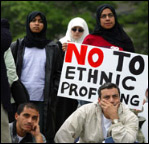 
RECENT CASES:
Civil Rights Update – 01/16/07
The Civil Rights Department at CAIR-Chicago currently has 704 cases documented in which 281 cases are active and are being pursued by department personnel. Below are the cases that were reported to CAIR-Chicago within the last two weeks.
Government:
- Eight more Muslims have reported delays in their citizenship process. Some of these individuals have passed the exam and met all the necessary requirements for obtaining citizenship. However, due to a new USCIS policy, some Muslims have had their interview dates cancelled, and are experiencing delays prior to their citizenship interview. The new policy requires security checks to be completed before being able to interview for citizenship. CAIR-Chicago is incorporating these cases into the Citizenship Delay Project. For more information on the Citizenship Delay Project, please see the action alert below.
- A Muslim man reported discrimination when trying to obtain an H1 visa to work in the United States. CAIR-Chicago is investigating the matter and will advise the man on how to proceed.
- A Muslim man reported being delayed while traveling from Pakistan to Chicago. CAIR-Chicago is incorporating this case into its Travel Free Project and will assist the man in getting safe listed with the Transportation and Security Administration.
ONGOING PROGRESS:
View reports of ongoing progress for cases with the Civil Rights Department in the "Progress Report" section.
ACTION ALERTS:
Citizenship Delay Project - Religious Discrimination Delays Citizenship Process:
As a joint effort with the Arab American Action Network (AAAN), the National Immigrant Justice Center (NIJC), and Competition Law Groups, CAIR-Chicago is asking individuals who have been delayed in obtaining citizenship to contact us at .
Travel Free Project - Muslim Americans Detained and Questioned When Traveling Outside of the U.S.:
If you are a Muslim woman who practices wearing hijab, and have been singled out at the airport for allegedly random searches, while observing that other travelers not wearing hijab were not singled out, please contact .

 - CAIR-Chicago Executive Director to Give Friday Sermon At the American Islamic Association of Frankfort
February 16, 2007
- Outreach Coordinator to speak on Islam at St.Paul's Church
February 25, 2007
- Executive Director to Speak on Christian-Muslim Relations at Lincoln Park Church
March 11, 2007
- Executive Director to Speak at upcoming Global Issues Forum at Benedictine University
March 14, 2007
|
 |

JOIN CAIR-CHICAGO AT OUR 3RD ANNUAL FUNDRAISING BANQUET!

CAIR-Chicago's Third Annual Event is set to take place Inshallah on Sunday, February 11th, 2007 at The Drury Lane Theatre in Oak Brook. Please mark your calendars and show your support by attending that day.
Click Here to RSVP
We are also recruiting volunteers to help with this event, If you are interested in helping a chapter of the largest Muslim civil rights and advocacy group in the country, please contact our Outreach Coordinator at .
SPRING 2007 INTERNSHIP OPPORTUNITIES AT CAIR-CHICAGO
CAIR-Chicago, the local chapter of the Council on American-Islamic Relations (CAIR), is currently offering 18 new internship opportunities. CAIR is the nation's largest Muslim civil rights organization. The organization's mission is to enhance the understanding of Islam, encourage dialogue, protect civil liberties, empower American Muslims and build coalitions that promote justice and mutual understanding.
All internships are unpaid. Internships last one semester and include a 12-hour/week commitment. Applicants should email a resume and cover letter to Dina Rehab, Outreach Coordinator, at: .
APPLICATION GUIDELINES:
clearly indicate which internship opportunity you are applying for in your cover letter. If you are applying for more than one position, please list in order of preference (please note: spring internships usually run from January through May). Applications that do not list the above information will not be processed. If you have any questions, please email all inquiries to . Students interested in receiving class credit, should indicate so in their cover letters. Credit will be arranged during the first week of the academic semester.
Listing of all internships by department:
Civil Rights:
CIVIL RIGHTS INTERN
LAW CLERK (Open to Law Students Only)
Communications:
COMMUNICATIONS INTERN
CHURCH PROJECT INTERN
FAITH CORE ONLINE MAGAZINE INTERN
PHOTO JOURNALIST INTERN
Governmental Relations:
GOVERNMENTAL RELATIONS INTERN
GOVERNMENTAL RELATIONS COMMUNITY ORGANIZING VOLUNTEER RECRUITER
VOTER EDUCATION PROJECT INTERN
POLICY RESEARCH INTERN 
Operations:
INFORMATION DESK
OPERATIONS INTERN
INFORMATION TECHNOLOGY INTERN
EXECUTIVE ASSISTANT INTERN
Outreach:
PUBLIC RELATIONS INTERN
PUBLIC EDUCATION INTERN
HUMAN RESOURCES INTERN
MUSLIMS CARE PROJECT INTERN
CAIR-Chicago's Muslim Activist Website
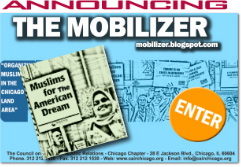


    

Executive Director
Ahmed Rehab
Civil Rights Coordinator
Christina Abraham
Outreach Coordinator
Dina Rehab
Governmental Relations Coordinator
Sadiya Ahmed
Operations Coordinator
Sabah Ahmed
Communications Coordinator
Sultan Muhammad
Staff Attorney
Heena Musabji, Esq.
Legal Advisor
Maaria Mozaffar
Community Organizer
Haady Taslim
Sensitivity Training Coordinator
Veronica Zapata
Board of Directors
Alif Muhammad
Ahmed Rehab
Hina Sodha, Esq.
Yaser Tabbara, Esq. - Secretary
Mazen Kudaimi, MD - Vice President
Safaa Zarzour, Esq. - President

Click Here

Click Here

Click Here
|
 | CAIR-Chicago
| CAIR-Chicago
 | CAIR-Chicago
| CAIR-Chicago
